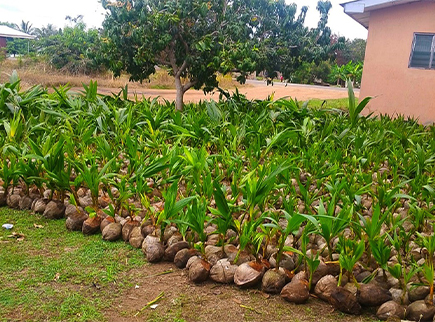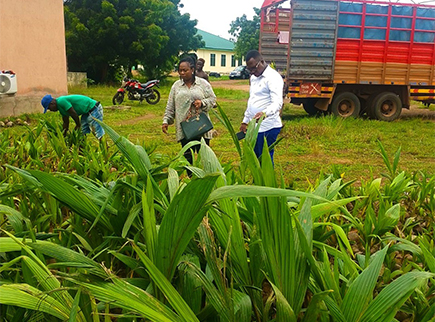The Adaklu District has received 10,000 coconut seedlings under the National Coconut Project to promote coconut cultivation, expand employment opportunities, and improve household incomes.
The initiative formed part of the government’s broader agenda to diversify agriculture, seeks to strengthen the tree crop subsector while supporting farmers to venture into high-value crop production.
District officials say the seedlings will be distributed to farmers across Adaklu communities in the coming days, with a call for proper nurturing to ensure maximum survival.
Mr. Jerry Yaw Ameko, Adaklu District Chief Executive (DCE), described the support as a “timely intervention” that would contribute to sustainable agricultural development in the area.
“We are grateful to H.E. John Dramani Mahama for demonstrating commitment to empowering farmers. This project will not only improve incomes but also create new job opportunities for our youth,” Mr. Ameko said.
He urged beneficiaries to treat the seedlings with care and seriousness, adding, “If you manage these seedlings well, they will become a source of wealth for your families in the future.”
The Department of Agriculture has tasked its extension officers to provide technical guidance to farmers to improve planting, disease management, and harvesting methods.

Mr. Adamu Kwame, a coconut farmer from Adaklu-Tsrefe, told GNA the project would help reduce poverty in rural households. “This support means a lot to us. Coconut farming has ready markets, and with proper guidance we can make a good living,” he said.
The National Coconut Project was launched as part of the government’s Tree Crops Development Authority programme, which promotes crops such as cashew, mango, oil palm, rubber, and shea alongside coconut.
Agricultural experts believe coconut farming has the potential to become a major export commodity, contributing significantly to Ghana’s foreign exchange earnings in the next decade.
According to the Ministry of Food and Agriculture, the global demand for coconut and its by-products is rising, creating a strategic opportunity for Ghanaian farmers to benefit from international trade.
Mr. Ameko reaffirmed the Assembly’s readiness to collaborate with farmers, extension officers, and development partners to ensure the project’s success. “This is a collective responsibility. We must all work together to make Adaklu a model of sustainable coconut farming,” he said.
The coconut seedlings distribution marks a milestone in the district’s agricultural calendar, expected to transform livelihoods while positioning Adaklu as an emerging hub for tree crop cultivation in the Volta Region

